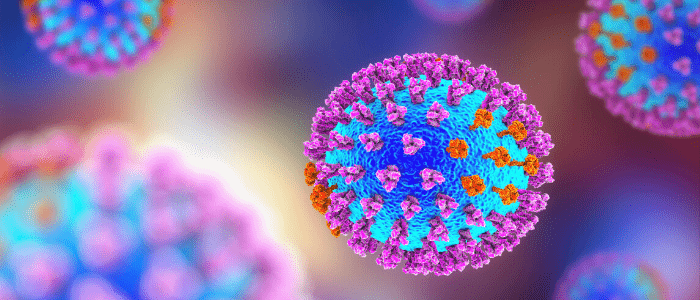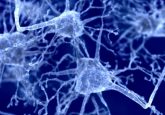Navigating the COVID-19 pandemic – a new way of living for people with multiple sclerosis?

I’m anxious. It started in late-February and hasn’t stopped. It rises and falls but it’s always there. When I wake in the morning, for about 5 seconds it disappears. But, in a flash everything comes flooding back. Sometimes it reaches uncontrollable levels and I feel terrified and cry. Most of the time it’s just there, a constant gnawing feeling at the pit of my stomach. Navigating a pandemic when you’re ‘vulnerable’ is far from easy.
I was diagnosed with multiple sclerosis (MS) in 2008, aged 28. I also live with several other long-term conditions, including chronic urticaria/angioedema, irritable bowel syndrome and obsessive–compulsive disorder. Having MS and urticaria/angioedema means I’m classed as ‘clinically vulnerable’. Acquiring any infection, COVID-19 or otherwise, can cause flare-ups. Additionally, every person in my household falls into one or more ‘vulnerable’ categories. My parents are both over 70 and my mum also has a chronic lung condition and hypertension. My sister is in the category defined by the government as ‘extremely vulnerable’. She is one of the around 1.5 million people who have been told to ‘shield’ because she is immunosuppressed [1]. In the past few months, everyday life has turned into a minefield.
Personalized health information has never been so important
While having MS automatically makes me vulnerable [2], not all people with MS have the same level of vulnerability. Disease-modifying therapies, specific MS symptoms and other health conditions all have an impact. Being able to understand this and determine how vulnerable you are is key to patients being able to obtain the support they might require and make decisions about their healthcare.
There is some fantastic information being provided by MS charities. The team at Bart’s-MS (UK), headed by Gavin Giovannoni, has set up an MS and COVID-19 microsite [3], and they are posting daily about the virus on their research blog [4]. Information has been consistent, coordinated, timely and relevant on all fronts, however, we need to ensure that people have the ability to apply that information to their own circumstances. Plus, they need to know it’s available. Even as we head into our third month of the outbreak, social media is revealing people who are unsure, confused and are obviously lacking good information sources. Good information is important, but good dissemination is crucial.
The ability to self-manage is key
Access to good information is also crucial for being able to self-manage my health. MS teams around the country, including my own, are being redeployed to general medicine to help fight COVID-19. It’s important for me to know how to recognize when I should contact my MS team, how I can contact them and what I can be doing to help myself, not just now but always. The MS Brain Health [5] initiative has always been my go-to for self-management tips. Other tools available include symptom-monitoring apps, like SymTrac™ (Novartis, UK) [6], EDSS tracker (Bart’s-MS) [7] and Cleo™ (Biogen, UK) [8]. There are also free self-help guides like the MyMS support program from talkHealth [9] and the online fatigue management course by the MS Society [10]. Furthermore, there are many online communities where I can share experiences and obtain peer-to-peer advice, such as Facebook groups, Lyfebulb [11], Curatio [12] and Wego Health [13].
The pandemic has also created the opportunity for me to attend congresses and conferences that I wouldn’t otherwise have the chance to attend, either because of entry restrictions (most are for healthcare professionals, researchers and/or industry), time or distance. I’m signed up for the European Academy of Neurology Congress (23–26 May 2020), for instance, as there is now free online access. Hopefully these events will remain open in the future, as even outside the pandemic situation, it is important to extend patient access to as much information as possible so that we can expand our knowledge and apply it to self-managing our disease.
Need for alternatives healthcare solutions
Self-management will never replace my medical team. The pandemic situation has forced us to rethink what ‘normal’ care can look like. Telemedicine has become the norm. This suits me because I do an 80-mile round trip to see my neurologist when sometimes a 10-minute phone call is all I need. If telemedicine continues, it may provide more people with access to MS specialists, when they may currently be under the care of a general neurologist.
I know many people whose treatment has been stopped or delayed because of the pandemic. This has caused great anxiety. However, it’s a double-edged sword because where treatment has continued, patients are anxious, even terrified, about going to the hospital and possibly being exposed to COVID-19. The same can be said for clinical trials. Maybe this is the wake-up call that industry needs to accelerate alternative solutions, such as home infusions, ‘clean’ treatment centers, alternative formulations and decentralized trials. Not only could this alleviate patient concerns, it could increase adherence and uptake for certain medications, as well as improve recruitment and retention rates in clinical trials.
Everyday life has become a military operation…
A new normal for everyday life is also setting in. The simplest of tasks are taking much longer. At the start of the pandemic, setting up online deliveries and ensuring I could get the essentials for our household were my main concern. I spent hours online, in virtual queues, on hold and on the telephone registering my household as vulnerable with the supermarkets. For some supermarkets, having members of the household who are simply classed as ‘vulnerable’ was insufficient to obtain priority delivery slots. It wasn’t until my sister was notified of having to ‘shield’, that I was able to register. Having priority slots doesn’t guarantee availability either. I’ve had to use three or four different supermarkets during the pandemic, to ensure we receive at least one food delivery per week. And there is still constant anxiety of not knowing whether everything will arrive – especially soap, toilet paper and cleaning products, all essential items in a house where there are people who are immunosuppressed and who have bladder and bowel problems.
A pandemic also doesn’t mean things don’t go wrong in life. Unfortunately, we’ve had a run of bad luck with ‘practical’ things in the house. A flat tire on the car. The telephone line stopped working. Our boiler broke down. We have become adept at cobbling together solutions to avoid engineers from being called out. However, sometimes it’s unavoidable. The visit from the boiler engineer involved a stressful few days of preparation and an action plan for managing the visit before, during and after. All this expends mental and physical energy, neither of which I have in abundance.
…But the world has become more accessible
Despite the challenges, the world has become more accessible and I’ve been amazed at the opportunities I’ve had as a result of nations going into ‘lockdown’. There’s the chance to watch plays, musicals and concerts online, have virtual tours of museums and historical sites, participate in exercise classes being run all over the world, and learn new skills through online courses. Remote working has also become the norm. It makes me hopeful that the workplace and the world at large will now become more accessible to everyone.
The world knows how we feel
Finally, if there’s one thing that I hope people take away from this pandemic, it’s empathy for those of us living with long-term conditions, like MS, that can often limit our independence, our social life, our work and finances, and our desire to pursue hobbies, interests and exercise. Research by the MS Society shows that loneliness and social isolation already affects three in five people with MS [14], outside of a pandemic situation. Isolation is something many of us have grown used to, either because of ill health, stigma or lack of understanding from others, among other reasons. Consequently, we’ve been much better placed than the ‘healthy’ public to adapt quickly to the challenges of social distancing and self-isolation because we’ve already experienced it.
At the start of the pandemic many of us with MS and other conditions felt like we were being treated as ‘dispensable’ by society when “only the vulnerable will die from the virus” became a repeated phrase in the media. Now, we’ve seen that the virus is indiscriminate and even being young, strong and healthy offers no guarantee that you will come through it. As a result, I believe people are much more interested in their health. What many of us with long-term conditions do usually, such as avoiding people who are sick, has become acceptable rather than being considered socially offensive. I’ve seen people cooking fresher and healthier at home. People are finding novel ways to exercise. All of this will hopefully lead to healthier long-term lifestyles.
I often say that we all have a vested interest in being patient advocates to a certain extent because we will all be patients at some point. COVID-19 has created a nation of potential advocates who are taking an interest in infection rates, clinical trials, vaccine development, the state of the healthcare system and how to keep the vulnerable safe. As we move towards a new future, I hope that this continues and we have better understanding, better outcomes and better access for everyone.
Disclaimer
The opinions expressed in this editorial are those of the author and do not necessarily reflect the views of Neuro Central or Future Science Group.
[1] Public Health England. Guidance on shielding and protecting people who are clinically extremely vulnerable from COVID-19.
www.gov.uk/government/publications/guidance-on-shielding-and-protecting-extremely-vulnerable-persons-from-covid-19/guidance-on-shielding-and-protecting-extremely-vulnerable-persons-from-covid-19
[Accessed 16 May 2020]
[2] Cabinet Office. Staying at home and away from others (social distancing).
www.gov.uk/government/publications/full-guidance-on-staying-at-home-and-away-from-others/full-guidance-on-staying-at-home-and-away-from-others
[Accessed 16 May 2020]
[3] MS-Selfie. COVID-19 and MS.
https://sites.google.com/giovannoni.net/clinicspeak-dmt/covid-19-ms
[Accessed 16 May 2020]
[4] Bart’s MS Blog.
https://multiple-sclerosis-research.org/
[Accessed 16 May 2020]
[5] MS Brain Health.
www.msbrainhealth.org/
[Accessed 16 May 2020]
[6] SymTrac™
www.novartis.co.uk/symtractm
[Accessed 16 May 2020]
[7] EDSS Clinic Speak.
https://edss.clinicspeak.com/en/?fbclid=IwAR18Dkc4LwuWjOj5KXiqtrOrao6EzmP5KgMuUsC5J4H5J_yVQzmE46MQlu0#!/welcome
[Accessed 16 May 2020]
[8] Cleo™
https://cleo-app.co.uk/
[Accessed 16 May 2020]
[9] talkHealth Partnership. myMS support program.
www.talkhealthpartnership.com/psp/multiple_sclerosis.php
[Accessed 16 May 2020]
[10] MS Society. Online fatigue-management course.
www.mssociety.org.uk/about-ms/signs-and-symptoms/fatigue/managing-fatigue/online-fatigue-management-course
[Accessed 16 May 2020]
[11] Lyfebulb.
https://lyfebulb.com/
[Accessed 16 May 2020]
[12] Curatio.
www.curatio.me/
[Accessed 16 May 2020]
[13] Wego Health.
www.wegohealth.com/
[Accessed 16 May 2020]
[14] MS Society. Loneliness and social isolation affect three in five people with MS.
www.mssociety.org.uk/what-we-do/news/loneliness-report
[Accessed 16 May 2020]
You might also like:





